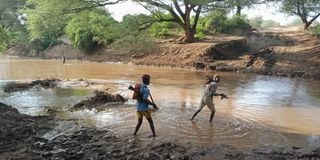Fresh cross border attacks threaten peace at Kenya-Ethiopia border

Armed warriors crossing River Nakuwa along the border of Kenya and Ethiopia.
What you need to know:
- Pastoralists from the two countries calling for sustained peace talks
- Kibish Deputy County Commissioner (DCC) Samuel Kiarie confirmed that the two Kenyans were shot dead in a region inhabited by the Dassanech community of Ethiopia, under unclear circumstances
Fresh cross border attacks is threatening peaceful coexistence at the Kenya-Ethiopia border, with pastoralists from the two countries calling for sustained peace talks.
It follows last Thursday’s incident where two Kenyan herdsmen were shot dead by militiamen within Omarate region in Southern Ethiopia while on a cross border trade mission.
Tension had hit the common border following the killing.
Kibish Deputy County Commissioner (DCC) Samuel Kiarie confirmed that the two Kenyans were shot dead in a region inhabited by the Dassanech community of Ethiopia, under unclear circumstances.
Bodies of the two male Kenyans are at Lodwar County and Referral Hospital mortuary awaiting postmortem.
“We are in touch with authorities in Ethiopia for conclusive investigations over the incident for necessary action that will not reverse peace building initiative gains at the border," Mr Kiarie said.
Pastoralists led by Peter Lochoto said authorities from both sides should enhance peace efforts along the border of Kenya and Ethiopia, as they fear that the prolonged drought and misinformation about isolated insecurity incidents may exacerbate conflict over limited water and pasture.
Mr Lochoto said Turkana County - Nyangatom Woreda District of South Omo Zone was experiencing drastic decline in water and pasture resources.
"The critical River Nakuwa and adjacent grazing fields are drying up. We appeal to Turkana county government through peace actors to advocate for sharing of limited resources at the border," he said.
Mr Albert Loperito, another herder noted that in July last year, development partners who include Pact International and Mercy Corps stepped up peace missions where locals were embracing homegrown solutions to conflicts along the border, banking on elders in peace committees to weed out rivalry.
He said peace along the border was not only beneficial to pastoralists, who are assured of access to pasture as well as attracting government services, like livestock vaccination and relief food, but also facilitating cross border trade.
On December 23, last year, Turkana Governor Jeremiah Lomorukai led a Kenyan delegation to the Southern Ethiopia region for South Omo Zone Nyangatom peace and cultural festival, held in Nyang'aten where former Ethiopia Prime Minister Hailemariyam Desalegm was the chief guest.
Mr Desalegm challenged the border pastoral communities which are spread across the East Africa region to abandon the retrogressive culture of cattle rusting and stay together for prosperity and development.
"My administration will pursue peace building and conflict management engagements because that is the only way our countries will prosper and get development that had been hindered because armed conflict," he said.
He blamed colonial boundaries for widened conflict and insisted on the need by the communities bound by common ancestry to stay and share resources.
Meanwhile, Kenya Defence Forces (KDF) is on a mission to stabilize security along the border with South Sudan and Ethiopia once they settle on the land set aside for military operations in the Turkana.
KDF was allocated 2,000 hectares of land in Kanamkemer, 1,000 hectares each in Kaputir, Kapedo/Napeitom, Lapur, Kibish, Lokichoggio, Nanam and Letea Wards as well as assured of access to 50,000 hectares for military training whenever need arises.
Brigadier Peter Asava who led a delegation from the KDF headquarters to Turkana in November last year assured the Turkana county administration led by County Secretary Peter Eripete that they will prioritize protection of lives and property of Kenyans along the borders.
"We will decentralize military operations to the borders where land has been allocated. At the same time, amenities will be installed to ensure border residents have access to basic services like water and health to spur development," Mr Asava said.
This will be the first time KDF will have new military camps besides their traditional ones that were established during the colonial days to meet the colonial masters’ security needs, which was to secure the white settlers.





